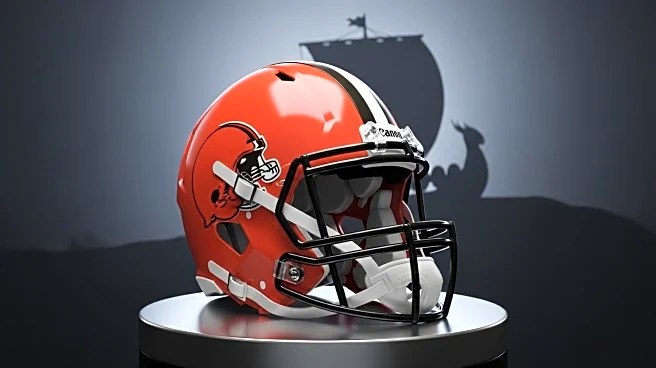What's Happening?
The Cleveland Browns are set to face the Minnesota Vikings in London, with rookie quarterback Dillon Gabriel making his NFL debut. Gabriel, a third-round pick, steps in after Joe Flacco's underwhelming performances. Historically, the Browns have struggled with debuting quarterbacks since their return to the NFL in 1999, with a record of 0-16 in such games. The team's quarterbacks have collectively managed a touchdown-to-interception ratio of 14-22 and a passer rating of 65.9, while the offense averages just 14.1 points per game. The Browns will also contend with the Vikings' top-ranked defense in terms of EPA per play.
Why It's Important?
This game is significant for the Browns as they attempt to break a long-standing losing streak with debuting quarterbacks. Dillon Gabriel's performance could influence the team's strategy moving forward, especially if he can overcome the historical odds. A successful debut could provide a much-needed boost to the Browns' season and potentially stabilize their quarterback situation. Conversely, another loss could exacerbate the team's struggles and pressure the coaching staff to find alternative solutions. The outcome of this game could have implications for the Browns' playoff hopes and overall team morale.
What's Next?
Following the game against the Vikings, the Browns will need to assess Gabriel's performance and decide whether to continue with him as the starting quarterback. The coaching staff, led by Kevin Stefanski, may need to adjust their offensive strategies based on Gabriel's showing. Additionally, the team will have to prepare for upcoming games, potentially making roster changes or seeking new talent to strengthen their lineup. The Browns' management will also need to consider the long-term implications of their quarterback choices on the team's future success.
Beyond the Headlines
The Browns' ongoing quarterback challenges highlight broader issues within the franchise, including talent development and scouting. The team's inability to secure a stable quarterback since 1999 raises questions about their recruitment and training processes. This situation also reflects the high-pressure environment of the NFL, where teams must quickly adapt to changing circumstances and player performances. The Browns' efforts to overcome these challenges could serve as a case study for other teams facing similar issues.









